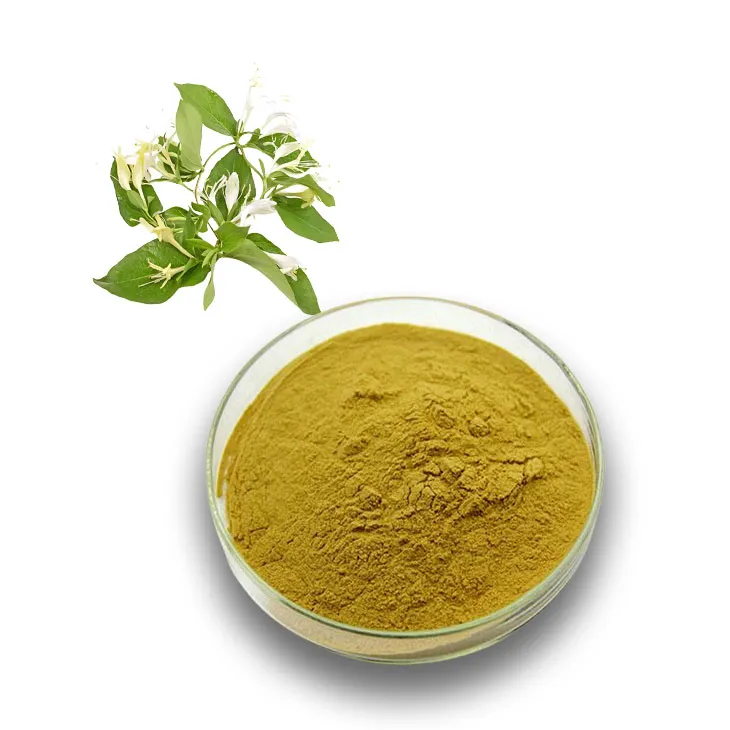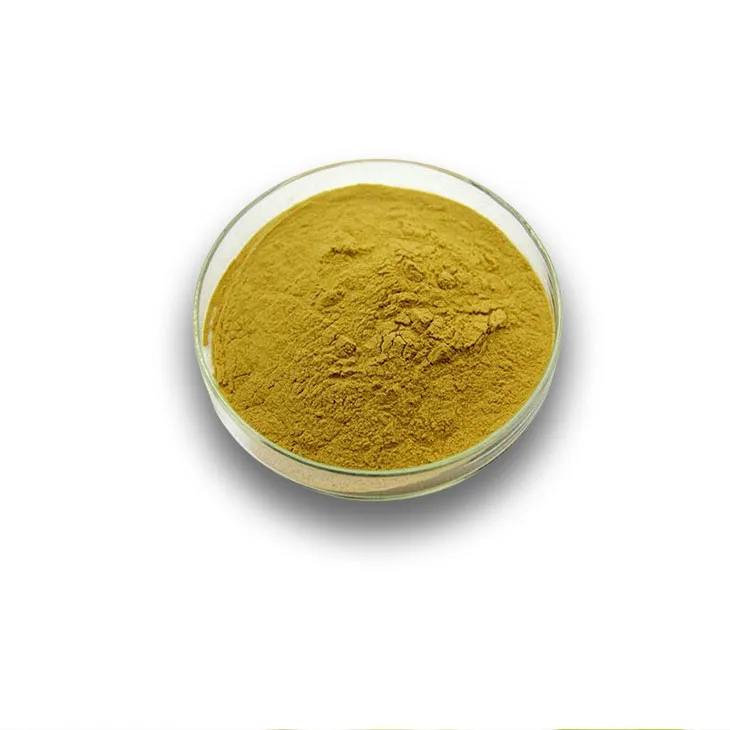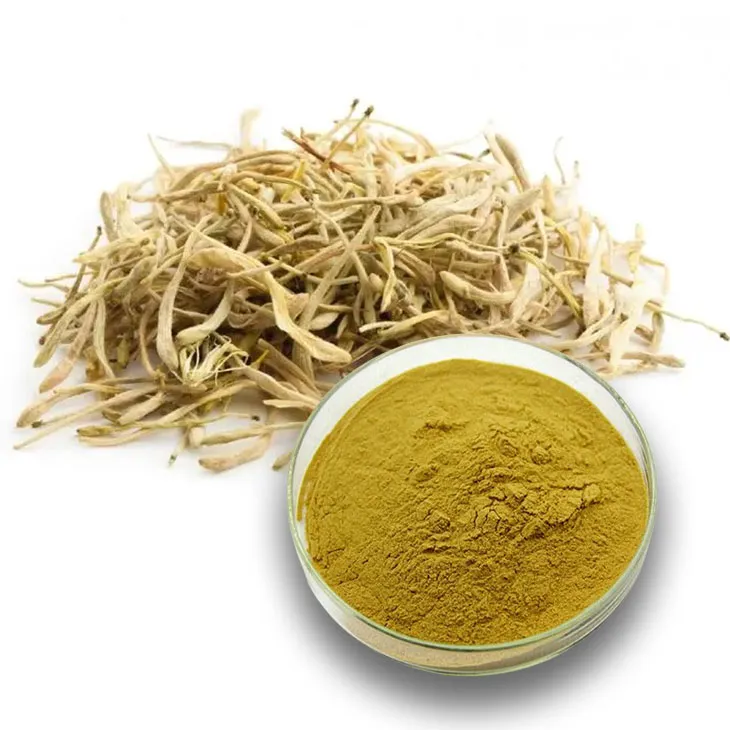- 0086-571-85302990
- sales@greenskybio.com
Honeysuckle pollen: Benefits, uses and possible side effects.
2024-11-13

Introduction
Honeysuckle, a well - known and beautiful flowering plant, has been used in various ways throughout history. One of its most interesting components is its pollen. Honeysuckle Pollen is not only a significant part of the plant's reproductive cycle but also holds potential value for human use. In this article, we will explore the many benefits, diverse uses, and possible side effects associated with Honeysuckle Pollen.

Benefits of Honeysuckle Pollen
1. Nutritional Value
Honeysuckle pollen is rich in nutrients. It contains a variety of vitamins, such as vitamin A, vitamin C, and some of the B - vitamins. Vitamin A is essential for good vision, healthy skin, and proper immune function. Vitamin C is a powerful antioxidant that helps protect cells from damage and aids in the absorption of iron. The B - vitamins play crucial roles in energy metabolism, nerve function, and the production of red blood cells.
In addition to vitamins, honeysuckle pollen also contains minerals like potassium, calcium, and magnesium. Potassium is important for maintaining proper heart function and regulating blood pressure. Calcium is necessary for strong bones and teeth, while magnesium is involved in over 300 enzymatic reactions in the body.
2. Antioxidant Properties
The presence of antioxidants in honeysuckle pollen is one of its most notable benefits. Antioxidants help combat free radicals, which are unstable molecules that can cause damage to cells and contribute to the development of various diseases, including cancer, heart disease, and neurodegenerative disorders.
These antioxidants in honeysuckle pollen can scavenge free radicals, reducing oxidative stress in the body. By doing so, they may help slow down the aging process, improve skin health, and enhance the overall well - being of the body.
3. Immune - Boosting Effects
Honeysuckle pollen has been shown to have immune - boosting properties. It can stimulate the activity of the immune system, helping the body to better defend itself against pathogens such as bacteria, viruses, and fungi.
Some components in the pollen may enhance the function of white blood cells, which are the body's main line of defense against infections. This can lead to a reduced risk of getting sick and a faster recovery time if illness does occur.

Uses of Honeysuckle Pollen
1. In Traditional Medicine
In traditional medicine systems, honeysuckle pollen has been used for centuries. It has been used to treat various ailments, such as respiratory infections. For example, it may be used to relieve coughs, sore throats, and congestion. The anti - inflammatory and antibacterial properties of the pollen are thought to contribute to its effectiveness in treating these conditions.
It has also been used to address digestive problems. Some traditional practitioners believe that honeysuckle pollen can help soothe an upset stomach, improve digestion, and relieve symptoms of indigestion such as bloating and gas.
2. In Cosmetics
Honeysuckle pollen is finding its way into the world of cosmetics. Due to its antioxidant and nutrient - rich properties, it is being used in skincare products. It can be added to creams, lotions, and masks to help nourish the skin, improve skin texture, and reduce the signs of aging.
The pollen may also have anti - inflammatory effects on the skin, making it suitable for treating skin conditions such as acne and eczema. By reducing inflammation and providing essential nutrients, it can promote healthier and more radiant skin.
3. In the Food Industry
Although not as common as other food ingredients, honeysuckle pollen is starting to be explored in the food industry. It can be used as a natural food additive, providing both flavor and nutritional value.
Some food products, such as certain types of honey or specialty baked goods, may incorporate honeysuckle pollen. It can add a unique floral flavor and a touch of sweetness to these items, while also offering the health benefits associated with its nutrient content.

Possible Side Effects of Honeysuckle Pollen
1. Allergic Reactions
One of the most significant possible side effects of honeysuckle pollen is allergic reactions. Just like other pollens, some individuals may be allergic to honeysuckle pollen. Allergic symptoms can range from mild, such as sneezing, itchy eyes, and a runny nose, to more severe, including difficulty breathing and anaphylactic shock in extreme cases.
People with known pollen allergies or sensitivities should be cautious when exposed to honeysuckle pollen. It is advisable to consult a doctor if there are any concerns about potential allergic reactions.
2. Over - Consumption Risks
While honeysuckle pollen has many potential benefits, over - consumption can also pose risks. Excessive intake may lead to digestive discomfort, such as nausea, vomiting, or diarrhea. This is because the body may have difficulty processing large amounts of the pollen at once.
Also, in some cases, over - consumption of pollen - rich substances may disrupt the body's natural balance of nutrients. It is important to consume honeysuckle pollen in moderation and follow recommended dosages if available.

Conclusion
Honeysuckle pollen offers a range of benefits, from its nutritional value and antioxidant properties to its uses in traditional medicine, cosmetics, and the food industry. However, it is essential to be aware of the possible side effects, such as allergic reactions and over - consumption risks.
As research on honeysuckle pollen continues, we may discover even more about its potential uses and how to maximize its benefits while minimizing any negative impacts. Whether you are considering using products containing honeysuckle pollen or are simply interested in its properties, understanding both the advantages and disadvantages is crucial.
FAQ:
What are the main health benefits of honeysuckle pollen?
Honeysuckle pollen is rich in nutrients such as proteins, vitamins, and minerals. It may have antioxidant properties that can help protect cells from damage caused by free radicals. It might also have anti - inflammatory effects, which could be beneficial for reducing inflammation in the body. Additionally, some believe it can boost the immune system, helping the body to better fight off diseases.
How can honeysuckle pollen be used in the field of medicine?
In traditional medicine, honeysuckle pollen has been used in various ways. It may be used in herbal remedies or supplements. Some traditional practitioners might use it to treat respiratory problems, as it is thought to have properties that can soothe the throat and lungs. However, it should be noted that more scientific research is needed to fully establish its medical uses.
Are there any uses of honeysuckle pollen in the beauty industry?
Yes, there are potential uses in the beauty industry. Due to its possible antioxidant and anti - inflammatory properties, it could be incorporated into skincare products. It may help in reducing skin inflammation, promoting a more youthful complexion, and potentially protecting the skin from environmental damage. But again, further research is required to confirm these effects.
What are the possible side effects of honeysuckle pollen?
Some people may be allergic to honeysuckle pollen. Allergic reactions can range from mild symptoms like itching, sneezing, and a runny nose to more severe reactions such as difficulty breathing or anaphylaxis in extreme cases. Also, if consumed in large amounts, it may cause digestive discomfort such as nausea, vomiting, or diarrhea.
How is honeysuckle pollen collected?
Honeysuckle pollen is typically collected by bees in nature. However, for commercial or research purposes, it can also be collected using specialized equipment. This involves carefully extracting the pollen from the honeysuckle flowers without causing damage to the plant. The collected pollen then needs to be processed and stored properly to maintain its quality.
Related literature
- The Nutritional and Medicinal Properties of Honeysuckle Pollen"
- "Honeysuckle Pollen: A Comprehensive Review of its Uses and Effects"
- "Potential Benefits and Risks of Honeysuckle Pollen Consumption"
- ▶ Hesperidin
- ▶ citrus bioflavonoids
- ▶ plant extract
- ▶ lycopene
- ▶ Diosmin
- ▶ Grape seed extract
- ▶ Sea buckthorn Juice Powder
- ▶ Beetroot powder
- ▶ Hops Extract
- ▶ Artichoke Extract
- ▶ Reishi mushroom extract
- ▶ Astaxanthin
- ▶ Green Tea Extract
- ▶ Curcumin Extract
- ▶ Horse Chestnut Extract
- ▶ Other Problems
- ▶ Boswellia Serrata Extract
- ▶ Resveratrol Extract
- ▶ Marigold Extract
- ▶ Grape Leaf Extract
- ▶ blog3
- ▶ blog4
- ▶ blog5
-
Organic Tongkat Ali extract powder factory.
2024-11-13
-
How to make powder with ashwagandha extract.
2024-11-13
-
Rosehip extract manufacturers from China.
2024-11-13
-
The best cat's claw extract in nature.
2024-11-13
-
Chinese Dandelion Leaf Extract Suppliers.
2024-11-13
-
Cocoa Extract
2024-11-13
-
Peppermint Extract Powder
2024-11-13
-
Tinospora cordifolia extract
2024-11-13
-
Saffron Extract Powder
2024-11-13
-
Ginseng Root Extract
2024-11-13
-
Passionflower Extract
2024-11-13
-
Boswellia Serrata Extract
2024-11-13
-
Gynostemma pentaphyllum extract
2024-11-13
-
Longan Extract
2024-11-13
-
Astaxanthin
2024-11-13





















